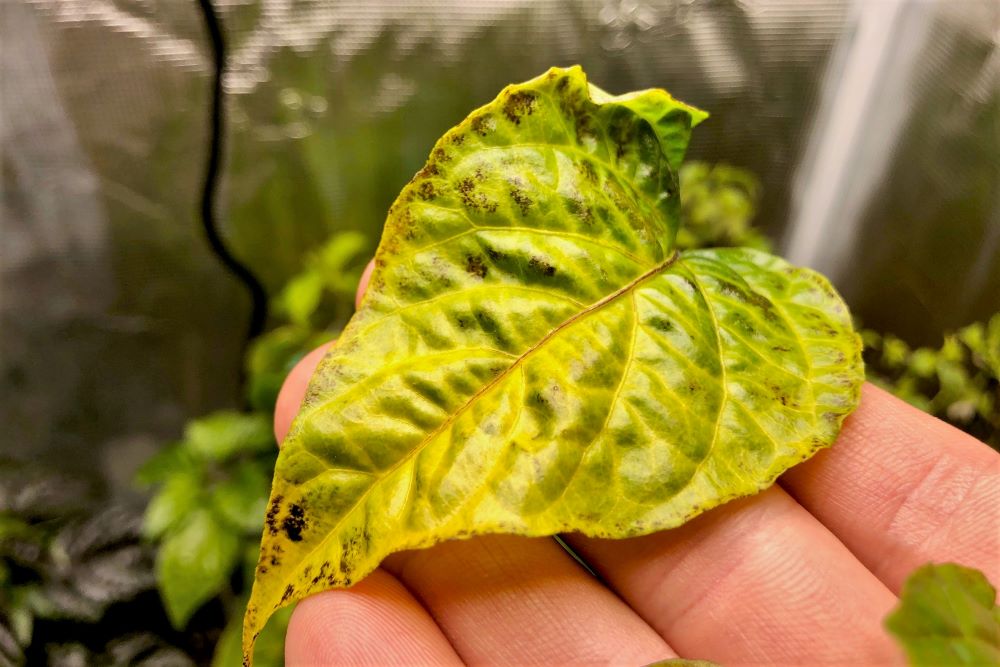Best Fertilizers for Peppers: A Comprehensive Overview to Boost Your Harvest
Best Fertilizers for Peppers: A Comprehensive Overview to Boost Your Harvest
Blog Article
Organic Vs. Synthetic Fertilizers: Which Is Best for Supporting Healthy And Balanced Pepper Plants?
In the world of nurturing healthy and balanced pepper plants, the option in between synthetic and natural plant foods stands as a pivotal choice with far-reaching implications. While both choices aim to provide crucial nutrients to support plant development, the nuances of their effect on the dirt, plant health, and the environment trigger an argument that echoes throughout the gardening area. Recognizing the distinctive advantages and prospective mistakes of each fertilizer kind is vital for pepper cultivators seeking to optimize their returns while preserving a lasting and eco-conscious strategy.
Benefits of Organic Fertilizers
Organic fertilizers use a lasting and environmentally-friendly approach to nourishing pepper plants, providing necessary nutrients without the use of synthetic chemicals. These all-natural fertilizers are acquired from organic resources such as compost, manure, bone meal, and algae, advertising dirt wellness and biodiversity. Unlike synthetic plant foods, organic options launch nutrients slowly, ensuring a stable and well balanced supply for pepper plants to grow.
One substantial benefit of organic plant foods is their capacity to enhance soil framework and water retention. By improving soil health, natural fertilizers promote useful microbial task, which helps in nutrient uptake by pepper plants. Additionally, organic fertilizers minimize the risk of chemical run-off, safeguarding water resources from contamination and protecting the environment.
Furthermore, organic fertilizers add to long-lasting dirt fertility by advertising the growth of beneficial dirt microorganisms. These microorganisms aid damage down raw material, releasing nutrients in a type that is conveniently obtainable to pepper plants. best fertilizers for peppers. By fostering a healthy and balanced soil environment, natural fertilizers support sustainable pepper growing practices that profit both plants and the environment
Disadvantages of Synthetic Plant Foods
Artificial plant foods, in comparison to their organic equivalents, pose different disadvantages when made use of to nourish pepper plants, influencing both plant health and wellness and ecological sustainability. One significant drawback of synthetic plant foods is their propensity to leach nutrients from the dirt promptly. This rapid leaching can lead to nutrition discrepancies in the dirt, creating plants to struggle with poisonings or shortages. Furthermore, synthetic plant foods can damage beneficial dirt microorganisms, such as earthworms and advantageous microorganisms, interfering with the soil ecosystem's balance.
Additionally, the overuse of synthetic fertilizers can add to water air pollution. Excess plant foods not soaked up by plants can remove into water bodies, bring about eutrophication, where algae flowers deplete oxygen degrees in the water, harming marine life. Furthermore, synthetic plant foods are generally originated from non-renewable sources, such as nonrenewable fuel sources, contributing to carbon discharges and ecological deterioration throughout their production.
Nutrient Absorption Comparison
Effective nutrient absorption plays a crucial duty in the total health and development of pepper plants. When comparing synthetic and organic plant foods in regards to nutrient absorption, natural fertilizers have the benefit of supplying an extra well balanced and slow-release source of nutrients (best fertilizers for peppers). Organic plant foods contain a range of macro and trace elements that are not just advantageous for the plants however likewise promote healthy and balanced soil microbial activity, which aids in nutrient uptake. On the various other hand, synthetic fertilizers commonly offer a quick launch of nutrients, which can bring about leaching and runoff, causing reduced nutrient absorption prices by the plants.
Furthermore, natural plant foods boost soil framework and water retention capacity, enabling pepper plants to gain access to nutrients a lot more effectively. This enhanced soil top quality helps with root growth, enabling much better nutrient absorption. Synthetic plant foods, although originally increasing plant growth due to their high nutrient focus, might impede long-term nutrient absorption by derogatory dirt health and wellness with time.
Ecological Effect Factors To Consider

On the other hand, synthetic plant foods, although usually even more concentrated and immediately offered to plants, can have damaging effects on the atmosphere otherwise applied correctly (best fertilizers for peppers). Their production calls for high power inputs, leading to greenhouse gas discharges and adding to climate modification. Additionally, the drainage of excess artificial plant foods can pollute water resources, causing eutrophication and harming aquatic ecological communities.
Best Plant Food Practices for Peppers
To achieve this, it is vital to comply with best fertilizer practices customized to the particular needs of pepper plants. One crucial method click for more info is to carry out a dirt test prior to applying any kind of fertilizers.
An additional vital technique is to fertilize pepper plants at the right time. Typically, peppers take advantage of getting plant food at growing and after that once more when they start to blossom. Over-fertilizing can cause vitamins and mineral discrepancies and hurt the plants, so it is vital to follow recommended application prices.
Furthermore, choosing a well balanced fertilizer with an NPK proportion that fits pepper plants' requirements is essential. Eventually, combining synthetic and natural fertilizers carefully can assist support healthy pepper plants while minimizing ecological effect.
Conclusion

Organic plant foods provide an environmentally-friendly and sustainable strategy to nourishing pepper plants, providing necessary nutrients without the usage of artificial chemicals. Unlike artificial plant foods, natural options release nutrients slowly, making certain a balanced and stable supply for pepper plants to thrive.
Synthetic fertilizers, in contrast to their natural counterparts, posture numerous downsides when made use of to nourish pepper plants, influencing both plant Discover More health and wellness and environmental sustainability. When comparing natural and artificial plant foods in terms of nutrient absorption, organic fertilizers have the advantage of offering a much more balanced and slow-release source of nutrients.Moreover, organic fertilizers improve soil framework and water retention ability, enabling pepper go to this site plants to access nutrients extra effectively.
Report this page